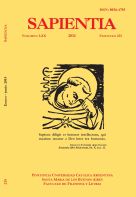El objeto formal de la vis cogitativa en Santo Tomás de Aquino
Keywords:
Cogitative, Intentio, Sensible per accidens, ObjectAbstract
According to the mind of St. Thomas Aquinas, the power of sensitive knowledge called «cogitative» may be considered in two ways. On the one hand, is the animal estimative and, as such, it apprehends the same formal object quod, namely, intentions of benefit or harm in the sensitive level. But because of its particular mode of operation, these intentions are not known by her only in order to the conservation of the human individual or species to which man belongs. The recognition of two dimensions in the cogitative power is justified in St. Thomas by the special relationship that exists between it and the universal reason. For one, the cogitative is not a different faculty from the natural estimate. For this, she apprehends necessary intentions for the perfection of human sensitive life. On the other hand, reason has a particular influence on the cogitative power that makes it operate in its own way, that is, discursively. This mobile character in the apprehension of the cogitative allows the formation of a sensory experience, under which its formal object is magnified. This becomes even more reasonable when you consider that the sensitive knowledge places the intellectual man. Thus, the cogitative not simply apprehends the individual as beneficial or detrimental to the survival of the knowing, but as a subject of a certain nature.Downloads
Download data is not yet available.
Downloads
Published
04/29/2019
How to Cite
Muszalski, H. (2019). El objeto formal de la vis cogitativa en Santo Tomás de Aquino. Sapientia, 70(235), 75–102. Retrieved from https://e-revistas.uca.edu.ar/index.php/SAP/article/view/1815
Issue
Section
Articles
License





 Sapientia
Sapientia